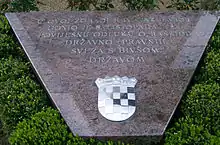Independence Day (Croatia)
Croatian Independence Day (Croatian: Dan neovisnosti) is a memorial day in Croatia, marked yearly on 25 June that celebrates the decision of the Croatian Parliament to declare the independence of Croatia from the Socialist Federal Republic of Yugoslavia.
| Independence Day | |
|---|---|
 The memorial plaque in front of the building where independence was proclaimed by the Sabor | |
| Observed by | Croatia |
| Significance | The day when the Croatian Parliament proclaimed independence from Yugoslavia |
| Celebrations | Laying of wreaths, banquets |
| Date | 25 June |
| Frequency | Annual |
History
The Croatian referendum on independence was held in May 1991, with 93% of voters supporting independence.[1] On 25 June, the Croatian Parliament (Sabor) proclaimed Croatian independence.[2] Seven days later, on 7 July, Croatia and Slovenia both signed the Brioni Declaration, in which the two countries agreed to suspend all declarations and acts passed by the Croatian and Slovenian parliaments related to those states' secession from Yugoslavia for a period of three months.[3] During that time, the Croatian War of Independence started.
On 8 October, the Sabor decided to end relations with Socialist Federal Republic of Yugoslavia,[4] in the Decision on the termination of the state and legal ties with other republics and provinces of Yugoslavia.[5][6] That session was not held in the House of Parliament but instead in the basement of an INA building, because of the possibility of the repeat of an incident such as the bombing of Banski dvori.[7]
Holiday
Independence Day was implemented by the Ivica Račan's government in 2001. It was celebrated for the first time in 2002.[8] In November 2019, at the proposal of the Cabinet of Andrej Plenković, the Croatian Parliament adopted a new law on holidays, and moved the Independence Day to 25 June, formerly the Statehood Day. This day is no longer an off-day and a public holiday, but a memorial day.[9]
References
- Citations
- Bennett 1995, p. 152.
- Ramet 2006, p. 392.
- Nizich, Markić & Laber 1995, p. 26.
- Cvitanic 2011, p. 78.
- "Odluka Sabora Republike Hrvatske o raskidu državno-pravne sveze s ostalim republikama i pokrajinama SFRJ (8. listopada 1991.)" [Decision of the Parliament of the Republic of Croatia on the termination of all state and legal ties with other republics and provinces of SFRY (8 October 1991)]. Povijest saborovanja (in Croatian). Croatian Parliament. 8 October 1991. Retrieved 25 June 2011.
- Croatian Parliament (1991). "Odluka (Klasa: 021-03/91-05/07)". Narodne novine (in Croatian) (53/1991). Archived from the original on 23 September 2009. Retrieved 26 November 2012.
- Mesić 2004, p. 364.
- Malenica, A.; Pavičić, D.; Maretić-Žonja, P. (26 June 2010). "Vladimir Šeks: Dan državnosti treba vratiti na 30. svibnja". Večernji list (in Croatian). Retrieved 18 November 2012.
- "Dan državnosti ponovno će se slaviti 30. svibnja, a uvodi se novi blagdan i neradni dan 18. studenog". Večernji list (in Croatian). 14 November 2019. Retrieved 17 November 2019.
- Bibliography
- Bennett, Christopher (1995). Yugoslavia's Bloody Collapse: Causes, Course and Consequences. C. Hurst & Co. Publishers. ISBN 9781850652281.
- Cvitanic, Marilyn (2011). Culture and Customs of Croatia. ABC-CLIO. ISBN 9780313351174.
- Mesić, Stjepan (2004). The Demise of Yugoslavia: A Political Memoir. Central European University Press. ISBN 9789639241817.
- Nizich, Ivana; Markić, Željka; Laber, Jeri (1995). Croatia: Civil and Political Rights in Croatia. Human Rights Watch. ISBN 9781564321480.
- Ramet, Sabrina (2006). The Three Yugoslavias: State-Building And Legitimation, 1918-2005. Indiana University Press. ISBN 9780253346568.